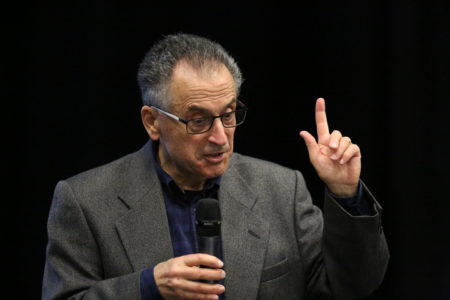
The words “I am not angry” begged more questions than it answered.
The words were spoken by holocaust survivor Peter Gaspar to a theatre full of Macleans College students recently.
He was one of only 132 Jewish children to survive Terezin concentration camp out of the 15,000 children that went in during WWII.
But he says he is not angry.
“Anger kills the hater much quicker than it kills the hated. There is no room for hatred in this world,” he says.
In 1942 he was just five years old and living in Bratislava when his family went underground, living in secret cellars, attics, garden sheds and orchards to escape the Nazis. They were moved from one place of hiding to the next in the dead of night.
“They saw our common humanity, rather than the fact that they were Christian and we were Jewish,” Gaspar says of the people who risked their lives to hide them.
They stayed ahead of the Nazi Death squads, staying hidden until the end of 1944 before the Jewish family turned themselves in after Gaspar fell deathly ill.
Gaspar and his mother where sent to Terezin, separated from his Father who was sent to a Labour camp in Germany.
“Terezin was a holding operation, a halfway house to extermination,” he says.
“From Terezin every week transport vans left for extermination camps, mainly Auschwitz… you never knew how long before you were put on the van.”
Terezin had been built to hold 7000 people. In 1942 to 1945 it contained 30,000 Jewish prisoners.
“It was a show place for Hitler to show how well he was treating the Jews. A film was made in 1944 called Hitler gave a town to the Jews to protect them from the horrors and the ravages of war,” he says.
The Red Cross visited the concentration camp to confirm the Jewish were being treated as well as the Nazi propaganda claimed.
“They found that there were tables outside cafes, people in coats, button downs and ties, having cake and drinking coffee,” Gaspar recalls.
“But it was all a show.”
A bakery was opened and Terezin money was printed and given to people to buy bread, he says.
“They went in as they were ordered and bought some bread. And as they walked out with the bread, round the corner a soldier with a gun took the bread away from them, took it round the back door of the bakery and put it back on the shelf.”
Terezin was not an extermination camp but tens of thousands of people died within its walls from starvation and malnutrition riddled with lice and disease.
In May of 1945, Peter and his mother were liberated from the camp. Only two other family members survived the holocaust – Gaspar’s father and his uncle.
In 1949 they arrived in Australia to start a new life.
Gaspar has since returned to Bratislava to thank the people who helped save his life.
The son of a family who hid Gaspar told him they were grateful that they got to help him and his family hide.
“You gave [my parents] the opportunity to prove to themselves that they were the people they thought they were.”
In 2006, after his retirement, Gaspar joined the Courage to Care organisation teaching young people about the dangers of prejudice and discrimination.
He tells the students, “don’t ever be a bystander.”
“Five million Europeans stood by and let the holocaust happen. We each have the power to make a difference in the life of another person, but we need to make the decision to stand up to evil.”
Gaspar was in Auckland as part of the Jewish Federation of New Zealand’s 2017 HOPE Talk.









